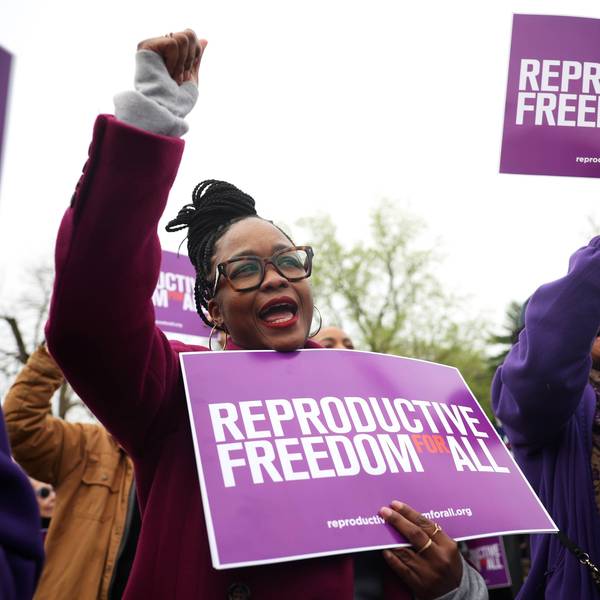As new reporting on Amber Nicole Thurman's death highlights the dangers of Georgia Republicans' six-week abortion ban, a human rights group on Tuesday released a research brief about how a similar policy in a neighboring state "harms the health and safety of Florida patients while obstructing clinicians from providing basic reproductive and maternal medical care."
The Physicians for Human Rights (PHR) report, Delayed and Denied: How Florida's Abortion Ban Criminalizes Medical Care, focuses on the prohibition that was signed by Republican Gov. Ron DeSantis last year but didn't take effect until May, following a state Supreme Court ruling.
The PHR brief follows late May reporting on how wait times soared at abortion clinics in the states closest to Florida after its ban took effect and the Guttmacher Institute's findings from last week that the law led to a "substantial drop" in clinician-provided abortions across the state, in part because many people don't even know they are pregnant until after six weeks.
"Florida clinicians shared harrowing accounts of how routine medical care has been delayed, denied, and deviated from standards of care."
This summer, PHR interviewed 25 of Florida's reproductive healthcare providers about their experiences caring for pregnant patients under the six-week ban. Brief co-author Dr. Michele Heisler said in a Tuesday statement that "Florida clinicians shared harrowing accounts of how routine medical care has been delayed, denied, and deviated from standards of care."
"Not only abortion care but miscarriage and broader maternal healthcare have suffered gravely due to the state's ban," noted Heisler, PHR's medical director and a professor of internal medicine and public health at the University of Michigan.
"Our research brief sheds new light on the health and rights crisis fueled by Florida's abortion ban—on patients, providers, and the medical system as a whole," she said. "Under the state's abortion ban, Floridians have lost their reproductive autonomy."
One Florida doctor in private practice told PHR that "with the six-week ban, I would say it is more like the inability to really offer anything at all now. I mean, we see patients for their new obstetrician-gynecologist visits usually around eight weeks, and sometimes we see them earlier, if they are having bleeding or other issues where we end up scanning them earlier."
"But I do not think I have ever had a viable pregnancy that was less than six weeks that I could offer a termination," the OB-GYN said. "They are never less than six weeks, so it is essentially impossible. By the time we see them for their first visit, that option is already gone."
Florida's ban technically allows some abortions after six weeks—in cases of rape and incest, or to protect the health of the pregnant person—though medical professionals and reproductive rights advocates often point out that many patients are still denied legal care even with the limited "exceptions" in place.
Before the current law, Floridians were living under a 15-week ban, which took effect in the wake of the U.S. Supreme Court's right-wing supermajority reversing Roe v. Wade with its June 2022 Dobbs v. Jackson Women's Health Organization ruling.
One doctor who spoke with PHR recalled a story from that period: "I strongly remember a patient who had severe kidney disease and was admitted to the hospital and was teetering on the edge of that 15 weeks. I think she was 14 weeks or so, and she got admitted, and we were trying to figure out how best to help her. She was getting sicker and sicker."
"[We] had to bring it to the head people of the hospital and be like, 'What are we allowed to do?' And they were like, 'She is not sick enough yet.' And we had to wait for her to get sicker before we were even allowed to offer her termination. And she was past 15 weeks at that point," the OB-GYN explained.
"I think it took over two weeks for us to get an answer from the hospital administrators," the doctor added. "So that hit very strongly, because it was kind of insane that we had to wait for her to become sicker. We had to wait for her creatinine to bump and her kidneys to be about to fail before we were allowed to even offer her [termination]. Then we had to jump through so many hoops to be able to do it. It really changed everything that we did in our practice."
The report features several other stories of patient and provider frustrations and the dangers created by the six-week ban.
"The findings of PHR's research brief demonstrate the need to remove Florida's extreme abortion ban and restore access to comprehensive reproductive healthcare in the state," argued Payal Shah, brief co-author and the group's director of advocacy, legal, and research. "Both patients and providers are trapped in an unworkable legal landscape."
"Despite state health agency statements to the contrary, the state's abortion ban is an egregious intrusion on patient autonomy that is causing medical harm," Shah added. "The ban's criminal penalties and narrow, vague exceptions have compelled clinicians to deviate from established standards of care and medical ethics. These impacts constitute violations of Floridians' human rights."
Florida voters will soon have an opportunity to restore much broader access to abortion care. This November, they can vote "yes" on Amendment 4, a state constitutional amendment backed by Floridians Protecting Freedom that would enshrine the right to abortion before viability in Florida.
Former President Donald Trump, a Florida resident and the Republican nominee facing Democratic Vice President Kamala Harris in the battle for the White House, confirmed last month that he plans to vote "no" on the ballot measure. In response, Harris said that "I trust women to make their own healthcare decisions and believe the government should never come between a woman and her doctor... The choice in this election is clear."




